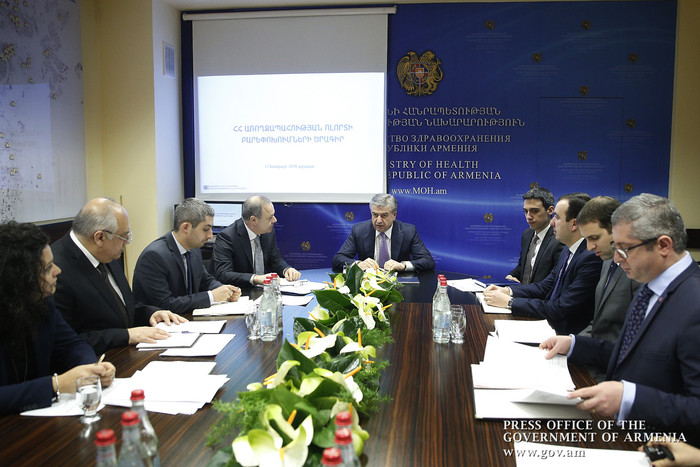Prime Minister Karen Karapetyan visited the Ministry of Healthcare to get acquainted with the activities and priorities completed in 2017, as well as the tasks set for 2018.
Healthcare Minister Levon Altunyan reported that the system underwent major transformations last year, which are expected to yield specific results in 2018. The Minister attached special importance to the provision of medical assistance through State-funded insurance packages offered to about 100 thousand beneficiaries under the reformed State Order Program. As he said, the necessary prerequisites have been created for organizing medical services for 612,000 socially vulnerable citizens and special groups in the current year. Chief of Healthcare Ministry Staff Nelson Zouloyan reported that 13 out of 16 priority tasks had been implemented in 2017, while the other three would be completed by the end of February. The four most important events for the previous year were implemented as well. Pursuant to the Prime Minister’s instruction, a foreign investments division has been set up with the main task of handing over various medical organizations to domestic and foreign investors for concession management.
Prime Minister Karapetyan welcomed the establishment of the division, stressing that today there is a lack of top-level managers in the country. The Head of Government said consistent steps need to be taken to introduce a new culture of management and promote competition in this sphere.
The Prime Minister was told that a new hotline had been set up at the Ministry with a new software package through which more than 31 thousand calls were received last year. In response to Karen Karapetyan’s question, Levon Altunyan noted that the new hotline is an effective tool for communication with the public; in the near future it is also planned to organize inquiries about the services provided in the healthcare system. It was also mentioned that as a result of optimization, 1.6 billion drams had been saved up, with about 40 thousand square meter premises discharged during the reporting period.
In 2018, the Ministry will have the priority task of introducing national strategies for combating malignant neoplasms and cardiovascular diseases, which are behind the highest death rates in Armenia.
The implementation of the Concept of Primary Health Care Reform is envisaged. Currently family doctors visit citizens’ homes 4-5 times a year, and it is envisaged to bring this figure to 10-12. It was noted that a bonus system will be introduced in the family doctor’s system, as a result of which their monthly salary will increase up to 2.5 times, and the increase in visits will promote the prevention and early detection of diseases. In order to make a better use of financial resources and improve the quality of medical services, the institution of case management has been introduced in the State Healthcare Agency. The quality of medical services will be by far improved with the use of clinical guidelines, patient management practices and procedures.
Based on advanced foreign expertise, over 300 international documents have been translated, localized, and approved in 2017. This process is to be continued. As an example of effective procedures, it was reported that the treatment of ischemic stroke in Armenia will be carried out mediating only 2 drugs instead of 11. As a result, patients will have to spend only 2,500-3,000 drams a day instead of 20-25,000.
Welcoming the initiative, Karen Karapetyan instructed to inform the public about the newly introduced practices and tools. “You have developed standards and norms that streamline those relations between a physician and a patient exposed to abuses and other risks. In addition, you offer citizens more affordable options. Now, if you want this mechanism to work, you should inform the beneficiaries. In this case, this mechanism will start working faster. The proposed scheme must be posted on the ministry’s website, and you should think of how to inform the public at large,” Karen Karapetyan emphasized.
It was noted that large-scale works have been carried out for the production of medicines and standardization and qualification of equipment, and there is great development potential. In particular, it was reported that the products of 5 local pharmaceutical companies meet the EU standards. The volume of medicines exported from Armenia increased by 20-25% last year, and this trend will be maintained this year, too. It was reported that the integrated e-health system capabilities are being expanded. Since May, 2017, the State-ordered services have been provided according to the e-health records.
It was noted that savings of financial resources are planned as a result of concentration of procurement processes as evidenced by a 24% increase in savings provided under a pilot project. A mechanism for obtaining free and privileged medicines under common rules and with common costs has been submitted to the Government for approval.
The procurement of medicines and medical products for some hospital services are planned to be carried out by means of centralized procurement, too. The goal is to reduce the cost of State-ordered services, which will allow more citizens to benefit from these services.
In conclusion, the Premier said he expected the healthcare system to increase its share in the GDP, optimize the budget, and ensure proper financial control and service quality. “As a whole, the staff and the team of the Ministry of Healthcare know where to go in order to achieve both the short-term and long-term targets. Tell the public about the logic behind what you are doing and what you are changing. I mean the Ministry’s policy vectors in addition to the norms that the citizen needs,” Karen Karapetyan underscored.



















































